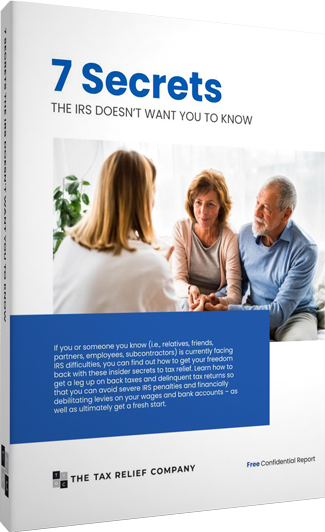Resolve Unpaid Payroll Taxes
You know that owing back payroll taxes puts you and your business in jeopardy from the IRS, don’t you?
And that the IRS takes unpaid payroll taxes very seriously. They will make every effort to collect what you owe even if it means taking legal actions against you or your business.
But, did you know that when you fail to settle your back-payroll taxes, you could be imprisoned by the IRS? And that the IRS can heap a hefty fine on you, including an assessment of penalties of up to 33 percent of what you already owe.
In the worst-case scenario, you might lose your business entirely. The IRS may shut you down and sell it off to pay back the payroll taxes that you owe.
You should realize that tax delinquencies happen to the best of business owners. It may not even be your fault. Perhaps a vendor or client might have closed their doors without paying his or her invoices and you are forced to take money from your cash flow to pay your regular business expenses. Then, you find that you have no money to pay your payroll taxes. The IRS will not care, they still expect you to pay your tax obligation on time.
Who are the responsible parties?
Among your responsibilities as an employer is the requirement to collect, report, and pay payroll taxes as required by federal and state laws. If you are a corporate officer or other “responsible party,” as defined by the IRS, you may be personally liable for payroll taxes not reported or deposited as required.
The IRS can also impose a penalty is called a Trust Fund Recovery Penalty (TFRP) which may be assessed against anyone who is responsible for collecting or paying payroll taxes and who willfully (with intention) fails to collect or pay them.
The IRS identifies one or more “responsible person(s) who have the duty to pay these taxes, were aware of their responsibility and didn’t do it because they “intentionally disregarded the law” or were “plainly indifferent to its requirements.
The TFRP amount is 100% of the withholding portion. The responsible party, in most cases, is not responsible for the company portion of the payment due. However, they would be responsible to pay the monies withheld from the employees’ paychecks. If the IRS decides that the responsible person or people have willfully failed to collect or pay taxes, they can take collection action against personal assets, including filing a federal tax lien or impose a seizure.
Payroll taxes as trust fund taxes
Trust fund taxes are taxes collected from someone (a customer or employee usually) and held by a business in trust until they are paid to a taxing entity. Sales tax and payroll taxes (income tax and FICA tax) are the most common types of trust fund taxes.
Make Any Current Payroll Tax Deposits
You should make every effort to pay your current payroll tax deposits when trying to resolve your back-payroll taxes.
This helps you avoid getting any further behind with what you already owe.
You MUST take action immediately
When you realize you owe back payroll taxes, you must take the necessary action right away. Avoiding this tax obligation or ignoring it altogether will only make the situation worse. The IRS will not go away.
They could close your business, put you in jail, and investigate your employees. There are options available to you and you should take advantage of them to settle what you owe and save your business.
You should also consult with a tax resolution specialist who can help you keep from having to shut your business down while you pay off your back-payroll taxes.
Don’t Contact the IRS on Your Own
You should avoid talking to the IRS on your own at all costs. The agent on the other end of the line could lead you to implicate yourself or ask you questions about your employees, and other details.
Instead of opening yourself up to additional liability, you should hire a tax resolution specialist to negotiate with the IRS on your behalf. An experienced tax resolution specialist will know what information to give them.
Engage the Help of a Tax Specialist
A tax resolution specialist can be a valuable asset in the effort to resolve your back-payroll taxes. They can protect you from IRS collections and can also advise you on the various tax relief programs that are available to you.
For example, they might advise you to pursue an Offer in Compromise, which could eliminate your entire tax debt or a penalty abatement, which could get rid of the penalties on your tax debt.
Coronavirus Tax Relief
We can help you get the relief you need during this pandemic. Call us at 877-355-8010 now to get all the help you need when dealing with the IRS.
Experienced IRS Tax Help
At SFS Tax Problem Solutions, we always act in a professional manner with your best interests in mind. We never make false promises or exact hidden fees from you. Our clients receive responsive tax resolution services and enjoy peace of mind.



